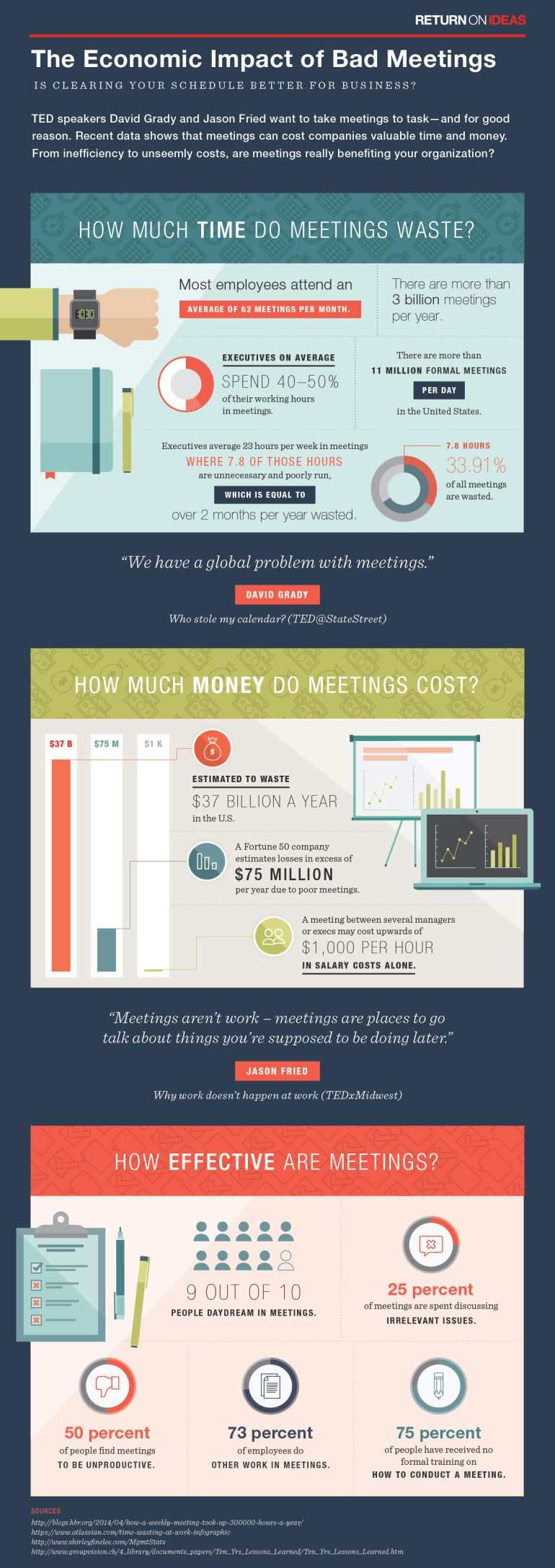
Meetings, meetings, meetings – we sit through them every week…..the good, the bad and the ugly! But we can make them more productive.
The impact of a bad meeting is significant.
Organizations hold more than 3 billion meetings each year.
Executives spend 40-50% of their working hours — or 23 hours per week — in meetings.
90% of meeting attendees admit to daydreaming in them.
73% acknowledge they do other work during meetings.
25% of meetings are spent discussing irrelevant issues.

However, meetings are key to an organisations ability to get things done, collectively deliver results and drive culture.
Here are some useful tips for more productive meetings.
Preparation and Agenda
All meetings should have an agenda so that people can be prepared and know the issues to be discussed. No meetings should take place without an agenda.
What’s The Point?
If you can’t simply answer this for your meeting then you should reconsider its value. The point of the meeting should be clear to all participants.
Daily Stand Up
Each day our team at Aurec have a 10 minute stand up meeting to talk about key activities including key clients, jobs, candidates, share market information and talk about our values. This 10 minutes is a quick way to align the team and save countless meetings between counterparts and discuss what is important.
Give Recognition
You can never give enough recognition. We share quickly each day about a colleague who has lived the values of our business and contributed in a significant manner. Recognition and gratitude should be natural in your meetings and their value cannot be underestimated.
Consider The Meetings Cost
What is the cost of the meeting you are holding? Think about the average wage of the employees in the room, is this meeting adding that much value? Is there a better way to communicate the message and/or close the issue without a meeting? If so then don’t hold a meeting.
Don’t Forget Your Culture!
Consider the cost of your meeting but don’t forget about your culture. At Aurec we share the chairing of meetings and start our weekly meeting with an icebreaker or activity (as it builds our culture). Equally we give time at the end of the meeting (10 minutes as part of our agenda) for the chair of the meeting to share something they have learnt in the previous week along with a personal passion.
The value this has added to the relationships in the office, our culture and our focus on improvement far outweighs the time taken on a weekly basis.
Everyone is in the game, no spectators
There is an artform to chairing a meeting successfully. You want to give space and ensure that everyone is in the game (engaged, present and willing to share ideas) and that no one is spectating. In saying this you want to ensure that everyone stays on topic and to the time allocated. If you are chairing the meeting then lead with purpose!
Start on Time!
This is one of my musts and should be straightforward but you would be surprised how many meetings are delayed or don’t start on time. One of my personal mantras is to always be on time. The message sent to the chair of the meeting and other attendees if you are not on time is that your time is more valuable than theirs and that it is ok for meetings to start late. Have consequences for late attendance.
Let others chair the meeting
This gives opportunity for growth, a new voice to be heard and challenges the team in new ways. Within our business we also use this as a tool to understand each other and give the chair of the meeting the opportunity to discuss their passions etc.
A New Venue?
People can be creatures of habit. Don’t be afraid to meet in a new room, switch up the seating (before the start of the meeting or icebreaker) or get creative with your meeting space.
If you have 1on1’s consider a walk and talk. This is one of my preferred methods of meeting as I feel it changes the tone of the conversation, allows people to let their guard down and can encourage more creative thinking.
Reflect and Change
Reflect on the meetings you have, seek feedback and if it is not working then change it! Ask attendees for feedback including:
What is the purpose of this meeting?
Do we need this meeting?
Does this meeting add value?
Is the purpose and agenda clear?
Are the right people in the room?
Did we give space for all people to contribute?
How can we improve this meeting?
No meetings are perfect but with transparent feedback you can adjust and improve moving forward. For example, our team was spending too much time in 1on1 meetings discussing key activities for the week. This is now on a blackboard and discussed via a stand-up meeting at the end of the day on Friday. Our quickest standup meeting of the week 😊
How do you run both efficient and effective meetings? Share your ideas below.
This article is originally published at www.matthewcossens.com/blog/
Subscribe to our newsletter and regular updates at www.matthewcossens.com/
Follow me and engage on LinkedIn at
Or follow the Facebook page at:
Comments